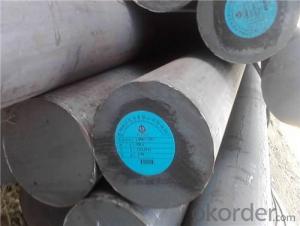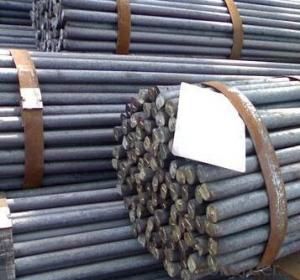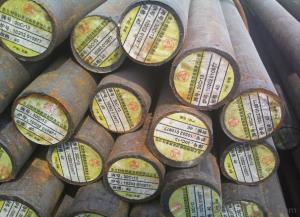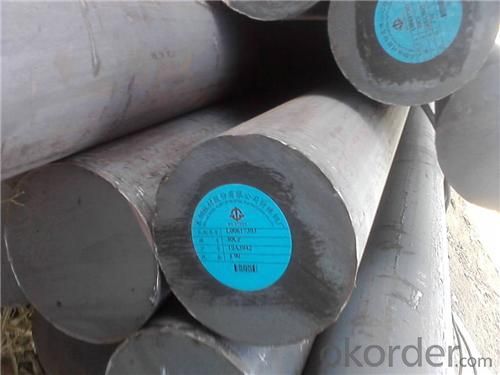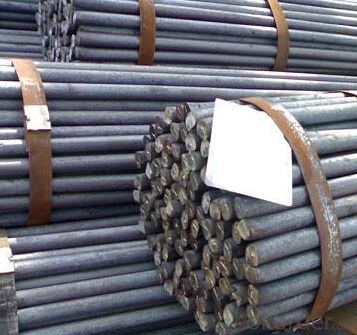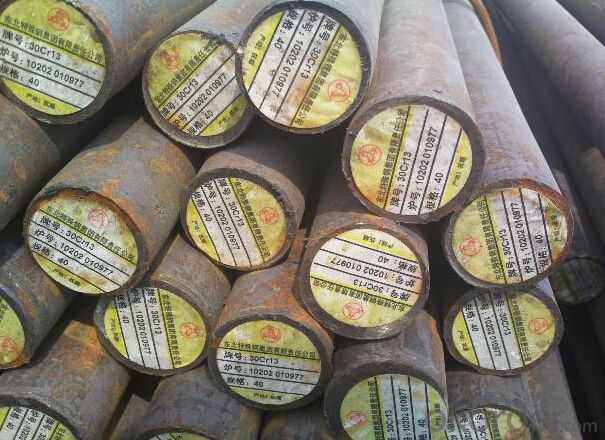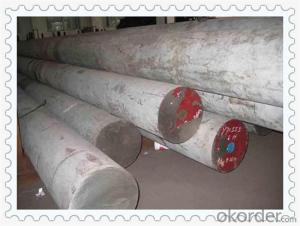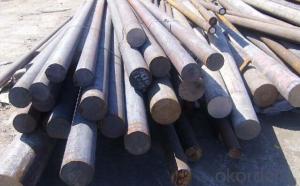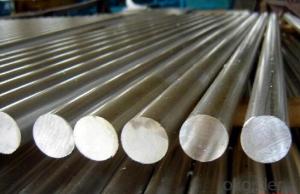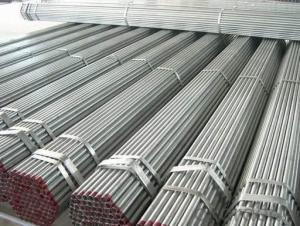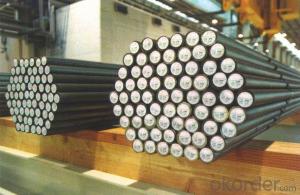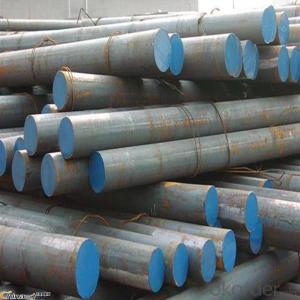AISI 4140 ASTM 42CrMo4 Steel Round Bar
- Loading Port:
- China main port
- Payment Terms:
- TT OR LC
- Min Order Qty:
- 30 m.t.
- Supply Capability:
- 10000 m.t./month
OKorder Service Pledge
OKorder Financial Service
You Might Also Like
Specification
AISI 4140 ASTM 42CrMo4 Steel Round Bar
Product Information:
Material: AISI 4140 hot rolled alloy steel bar
Diameter: 10mm-300mm
Length: 3000mm-12000mm Straightness: 3mm/M max
Process: EAF + LF + VD +rolled + Heat Treatment (optional)
Delivery condition: Hot rolled + rough machined (black surface after Q/T) + turned (optional)
Delivery Time: 30-45 days
MOQ: 25 tons
Heat treatment: Normalized / Annealed / Quenched / tempered
Technical Data: According to the customer's requirement of Chemical Composition, Physical Properties and Mechanical Testing
Test: Ultrasonic test according to SEP 1921-84 G3 C/c
Marking: Grade, heat NO, length will be stamped one each bar with required color
Application: Statically and dynamically stressed components for vehicles, engines and machines, parts of larger cross-sections, crankshafts, gears.
Product Overviews:
| Product Name | Typical Grades | Diameter(mm) | Standard adopted |
| Carbon Steel | 20 (1020/S20C/C22) | Ø16-Ø300 | GB/SAE/JIS/DIN |
| 40 (1040/S40C/C40) | |||
| 45 (1045/S45C/C45) | |||
| Bearing Steel | GCr9 (51100/SUJ1) | Ø12-Ø250 | |
| GCr15 (52100/SUJ2/100Gr6) | |||
| GCr9SiMn (A485-Gr.1/SUJ3) | |||
| Cr-Mo Steel | 20Cr (5120/SCr420H/20Cr4) | Ø12-Ø250 | |
| 40Cr (5140/SCr440/41Cr4) | |||
| 42CrMo(4140/SCM440/42CrMo4) | |||
| Gear Steel | 20CrNiMo | Ø16-Ø600 | |
| 20CrMn(5115/SMnC420/20MnCr5) | |||
| 20CrNiMo(8620/SNCM220/20CrMiMo2) |
Product Show:

Our Advantages:
· Industry experience over 20 years.
· Shipment of goods -More than 70 countries worldwide.
· The most convenient transport and prompt delivery.
· Competitive price with best service.
· High technical production line with top quality products.
· High reputation based on best quality products.
With our experienced, enthusiastic and dynamic staffs, we assure to bring you the products with best quality, reasonable prices and good after-sales services under the motto: Friends First, Business After.
Communication, Experience, Expertise and Best efforts are our Promises to you.
- Q: What are the international standards for special steel?
- The international standards for special steel are a set of guidelines and specifications established by organizations such as the International Organization for Standardization (ISO) and the American Society for Testing and Materials (ASTM). These standards outline the requirements for various properties of special steel, including its chemical composition, mechanical properties, and manufacturing processes. They ensure that special steel products meet the necessary quality and performance criteria for use in industries such as automotive, aerospace, and construction worldwide.
- Q: What are the different surface finishing techniques used for special steel?
- Some of the different surface finishing techniques used for special steel include electroplating, powder coating, galvanizing, passivation, and mirror polishing.
- Q: Can special steel be used for automotive engine components?
- Yes, special steel can be used for automotive engine components. Special steels such as high-strength, heat-resistant, and corrosion-resistant alloys are often employed in manufacturing engine components to ensure durability, performance, and efficiency under demanding conditions.
- Q: Can special steel be used in the power generation industry?
- Yes, special steel can be used in the power generation industry. Special steel alloys are commonly used in various power generation components such as turbines, boilers, and generators due to their high strength, corrosion resistance, and heat resistance properties. These alloys are designed to withstand extreme temperatures and pressures, ensuring the reliable and efficient operation of power generation equipment.
- Q: What are the different tooling grades of special steel?
- Special steel, which possesses specific characteristics and properties, is a type of steel designed and manufactured for various industrial applications. Within this category, there are different tooling grades that have their own unique composition and properties. These grades are specifically engineered to meet the demands of different tooling applications, ensuring optimal performance and durability. There are several common tooling grades of special steel: 1. High-Speed Steel (HSS): HSS is a type of tool steel that has excellent hardness, wear resistance, and heat resistance. It is ideal for high-speed cutting tools like drills, milling cutters, and taps. Even at elevated temperatures, HSS retains its hardness, allowing it to maintain cutting performance without losing its edge. 2. Hot Work Tool Steel: This type of steel is designed to withstand high temperatures and thermal cycling in applications such as hot forging, die casting, and extrusion. It possesses good toughness, high heat resistance, and excellent wear resistance, which enable it to retain its strength and shape even under extreme thermal conditions. 3. Cold Work Tool Steel: Cold work tool steel is primarily used for cutting and forming applications at lower temperatures. It exhibits high hardness, toughness, and wear resistance, making it suitable for applications like blanking, shearing, and cold forming. Cold work tool steel maintains its hardness even under compressive forces, ensuring long-lasting performance. 4. Plastic Mold Steel: Specifically designed for the production of plastic injection molds and related tooling, this type of steel possesses excellent machinability, high polishability, and good wear resistance. It can withstand the demanding conditions encountered during plastic molding processes, ensuring precise and high-quality molding performance. 5. Powder Metallurgy (PM) Steel: PM steel is a tooling grade manufactured using a powder metallurgy process. This method allows for the production of complex shapes, uniform microstructure, and improved properties. PM steels are commonly used in high-performance cutting tools, wear-resistant parts, and high-strength applications. These examples represent just a fraction of the different tooling grades available in special steel. Each grade is carefully engineered to meet the specific requirements of various tooling applications, ensuring optimal performance, durability, and efficiency in different industrial sectors.
- Q: Can special steel be used for jewelry?
- Yes, special steel can be used for jewelry. Special steel, such as stainless steel or titanium, is often used for making contemporary and modern jewelry pieces due to its durability, resistance to tarnish and corrosion, and affordability. It offers a unique and sleek aesthetic and can be crafted into various designs, making it a popular choice for jewelry makers and wearers alike.
- Q: What is the cost of special steel compared to regular steel?
- The cost of special steel is typically higher than that of regular steel due to its unique properties and manufacturing processes.
- Q: How does special steel contribute to the aerospace fastener industry?
- Special steel contributes to the aerospace fastener industry by offering enhanced strength, durability, and resistance to extreme temperatures and corrosion. These properties make it a crucial material for manufacturing aerospace fasteners, which are essential for holding aircraft structures together. The high-performance nature of special steel ensures the reliability and safety of fasteners, ultimately contributing to the overall efficiency and success of the aerospace industry.
- Q: Can special steel be used in the manufacturing of precision instruments?
- Indeed, precision instruments can benefit from the utilization of special steel. Special steel encompasses a range of steel types that have been purposefully crafted and processed to possess specific attributes, such as heightened strength, hardness, resistance to corrosion, and thermal stability. These unique qualities render special steel highly suitable for applications necessitating precision and accuracy, such as precision instrument manufacturing. Precision instruments, such as surgical tools, measuring devices, optical instruments, and scientific equipment, necessitate materials capable of retaining dimensional stability and enduring extreme conditions. Special steels, such as stainless steel, tool steel, and high-speed steel, provide exceptional mechanical properties, including remarkable tensile strength, resistance to wear, and dimensional stability. Consequently, these kinds of steel are well-suited for the production of precision instruments. Moreover, special steel can be engineered to possess specific characteristics, such as low magnetic permeability or excellent resistance to temperature fluctuations. These attributes prove particularly vital in precision instruments, as magnetic interference or temperature variations have the potential to impact their performance. To summarize, special steel can indeed be employed in the manufacturing of precision instruments due to its exceptional mechanical properties, dimensional stability, and ability to withstand harsh conditions. Its versatility enables the production of precision instruments of superior quality, fulfilling the stringent requirements of various industries, including the medical, scientific, and engineering sectors.
- Q: What are the main characteristics of magnetic steel?
- Magnetic steel, also referred to as ferromagnetic steel, possesses several essential features that render it highly suitable for a wide range of industrial applications. Firstly, magnetic steel demonstrates a robust magnetic field, enabling it to attract and retain magnetic materials. This quality plays a vital role in the production of electrical devices like motors, transformers, and generators, where the steel is utilized to establish magnetic circuits and enhance the efficiency of electromagnetic processes. Another significant aspect of magnetic steel is its high saturation magnetization, indicating its ability to reach maximum magnetic flux density under a given magnetic field strength. This attribute guarantees that magnetic steel can maintain a powerful magnetic field even when subjected to external forces or fluctuations in the magnetic field. Such stability and reliability render it ideal for applications that demand consistent magnetic performance. Moreover, magnetic steel exhibits exceptional electrical conductivity, which is of utmost importance in applications where the steel serves as a core material for electrical circuits. The superior electrical conductivity of magnetic steel minimizes energy losses and facilitates effective power transmission and distribution. Additionally, magnetic steel possesses a high coercivity, which denotes its capability to resist demagnetization. This characteristic is crucial in applications where the steel is exposed to fluctuating magnetic fields or mechanical stresses, as it ensures the long-term stability of its magnetic properties. In summary, the principal characteristics of magnetic steel encompass a strong magnetic field, high saturation magnetization, excellent electrical conductivity, and high coercivity. These properties establish magnetic steel as an indispensable material in various industries, including electrical engineering, power generation, and magnetic product manufacturing.
Send your message to us
AISI 4140 ASTM 42CrMo4 Steel Round Bar
- Loading Port:
- China main port
- Payment Terms:
- TT OR LC
- Min Order Qty:
- 30 m.t.
- Supply Capability:
- 10000 m.t./month
OKorder Service Pledge
OKorder Financial Service
Similar products
Hot products
Hot Searches
Related keywords
